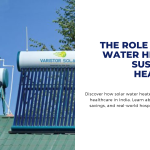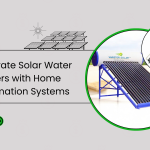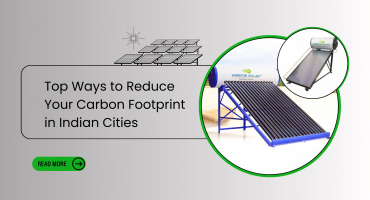
Varistor Solar is dedicated to empowering individuals, businesses, and communities with the transformative power of solar energy. We believe in a brighter, cleaner future and are committed to making sustainable living accessible to everyone.
+91-9113690456
Email: sales@varistorsolar.com
Varistor Solar
NO 40/C, KALKERE VILLAGE,12TH MAIN, NRI LAYOUT,Ramamurthy Nagar, Bangalore North,Bangalore- Karnataka, 560016
Introduction
Welcome to our beginner's guide on solar water heaters! In this comprehensive post, we'll delve into the world of solar water heating systems, focusing specifically on the choice between Evacuated Tube Collectors (ETC) and Flat Plate Collectors (FPC). Whether you're a homeowner in Bangalore or anywhere else looking to harness the power of the sun for your hot water needs, this guide will help you about ETC vs FPC Solar Water Heaters to make an informed decision.

Understanding Solar Water Heaters
Before we dive into the comparison between ETC and FPC solar water heaters, let's first understand what solar water heaters are and how they work. Solar water heaters utilize sunlight to heat water for various domestic and commercial purposes. They consist of collectors that absorb solar energy and transfer it to water, which is then stored in insulated tanks for later use.
What are ETC Solar Water Heaters?
Evacuated Tube Collectors (ETC) are one of the two main types of solar water heaters available in the market. ETC systems are comprised of multiple glass tubes, each containing an absorber coating that absorbs sunlight and converts it into heat. These tubes are arranged in parallel and housed within an insulated frame. Water flows through the tubes, where it is heated by the absorbed solar energy before being stored in a tank for use.
Advantages of ETC Solar Water Heaters
ETC solar water heaters offer several advantages:
Efficiency: ETC systems are highly efficient, especially in colder climates or during cloudy days, as they can capture solar energy from different angles.
Durability: The design of ETC collectors makes them less susceptible to damage from hail or other environmental factors.
Cost-Effectiveness: ETC systems are generally more affordable than FPC systems, making them a popular choice for residential and commercial applications.
Disadvantages of ETC Solar Water Heaters
Despite their numerous advantages, ETC solar water heaters also have some limitations:
Space Requirement: ETC systems tend to be bulkier compared to FPC systems, requiring more roof space for installation.
Maintenance: The tubes in ETC collectors may require periodic cleaning to ensure optimal performance, which can be cumbersome for some users.
Temperature Limitations: ETC systems may struggle to achieve high water temperatures in extremely hot climates.
What are FPC Solar Water Heaters?
Flat Plate Collectors (FPC) represent the other main type of solar water heaters available in the market. FPC systems consist of a flat, insulated metal plate with a dark-colored absorber coating, housed within a glass cover. Water flows through channels within the plate, where it is heated by the absorbed solar energy before being transferred to a storage tank.
Advantages of FPC Solar Water Heaters
FPC solar water heaters offer several advantages:
Simplicity: FPC systems have a simpler design compared to ETC systems, making them easier to install and maintain.
Space Efficiency: FPC collectors are generally thinner and more compact than ETC collectors, requiring less roof space for installation.
Temperature Performance: FPC systems are capable of achieving higher water temperatures, making them suitable for regions with hot climates.
Disadvantages of FPC Solar Water Heaters
Despite their advantages, FPC solar water heaters also have some drawbacks:
Lower Efficiency in Cold Weather: FPC systems may experience reduced efficiency in colder climates or during cloudy days, as they are less effective at capturing solar energy from different angles.
Vulnerability to Hail Damage: The flat design of FPC collectors makes them more susceptible to damage from hail or other environmental factors.
Higher Initial Cost: FPC systems are generally more expensive to purchase and install compared to ETC systems, although they may offer better long-term performance.
Choosing the Right Solar Water Heater for You
Now that we've explored the differences between ETC and FPC solar water heaters, how do you choose the right one for your needs? Here are some factors to consider:
Climate: Consider the climate of your location and how it might impact the performance of each type of solar water heater.
Available Space: Evaluate the amount of roof space available for installation and choose a system that fits within your constraints.
Budget: Compare the initial cost and long-term savings of ETC and FPC systems to determine which option aligns with your budget.
Water Usage: Determine your hot water usage patterns and select a system with an appropriate storage capacity to meet your needs.
Conclusion
In conclusion, both ETC and FPC solar water heaters offer distinct advantages and disadvantages. The choice between the two ultimately depends on your specific requirements, budget, and environmental conditions. Whether you're in Bangalore or anywhere else, making an informed decision based on these factors will ensure that you enjoy the benefits of solar water heating for years to come.
FREQUENTLY ASKED QUESTIONS
When deciding between Evacuated Tube Collectors (ETC) and Flat Plate Collectors (FPC) solar water heaters, consider factors such as your location's climate, available installation space, budget, and hot water usage patterns. ETC systems are more efficient in colder climates and offer cost-effectiveness, while FPC systems are space-efficient and suitable for hot climates.
Bangalore's climate, characterized by mild temperatures and occasional cloud cover, makes both ETC and FPC solar water heaters viable options. However, ETC systems may be more efficient due to their ability to capture solar energy from different angles, making them a popular choice for homeowners in Bangalore.
ETC solar water heaters may require periodic cleaning of the tubes to ensure optimal performance, while FPC systems generally have simpler maintenance needs. Regular inspection of components and ensuring proper insulation are essential for both types of systems to maximize longevity and efficiency.
Both ETC and FPC solar water heaters can still provide hot water during cloudy days, although their efficiency may be reduced. ETC systems may perform slightly better in such conditions due to their ability to capture solar energy from different angles, but FPC systems can still effectively harness sunlight for heating water.
The long-term cost savings between ETC and FPC solar water heaters depend on various factors such as initial cost, maintenance requirements, and energy efficiency. While ETC systems are generally more affordable upfront, FPC systems may offer better long-term performance and savings due to their higher efficiency in hot climates and simpler maintenance needs.
Now It's Your Turn:
Making the switch to solar water heaters in Delhi is a smart and sustainable choice. The top brands like Varistor Solar™, Racold, Havells, V-Guard, and AO Smith offer reliable options to meet your hot water needs efficiently.
Among these, Varistor Solar™ stands out as the top choice in India, trusted by many. We provide a variety of solar water heaters, catering to different preferences and requirements. Our clients trust us for our quality and performance.
For more details about our solar water heaters, call us at 9113690456 or email sales@varistorsolar.com. Choose Varistor Solar™ for a greener and more energy-efficient future.
"WHAT YOU CAN READ NEXT"
 Read more +18 April 2025 in Solar Water Heater
Read more +18 April 2025 in Solar Water HeaterThe Role of Solar Water Heaters in Sustainable Healthcare
 Read more +16 April 2025 in Solar Water Heater
Read more +16 April 2025 in Solar Water HeaterTop Benefits of Installing Solar Water Heaters in Hospitals
 Read more +16 April 2025 in Solar Water Heater
Read more +16 April 2025 in Solar Water Heater
 Call or Text:
Call or Text: 



